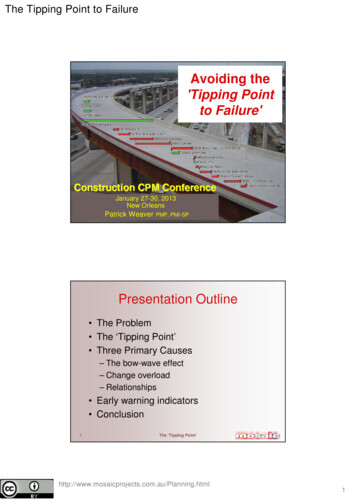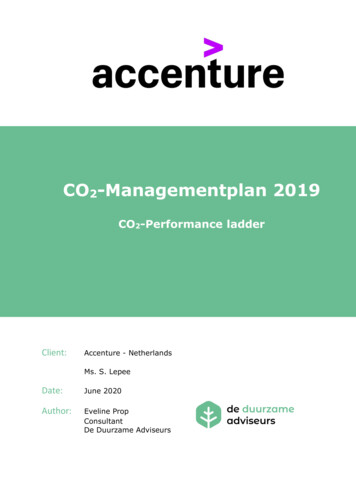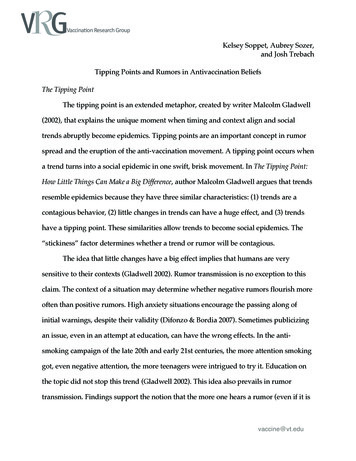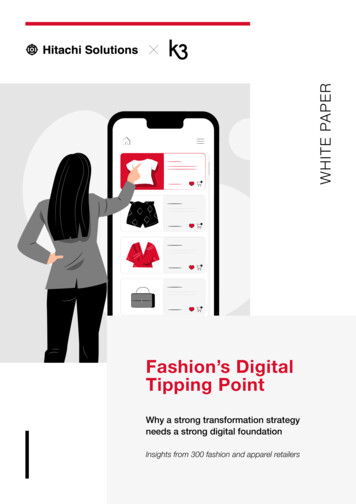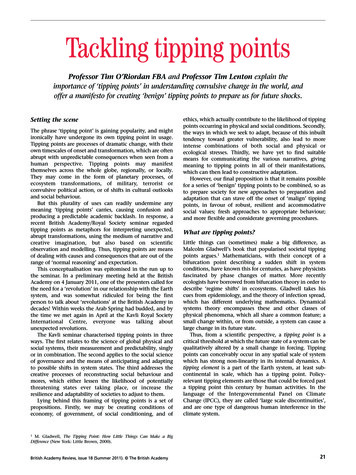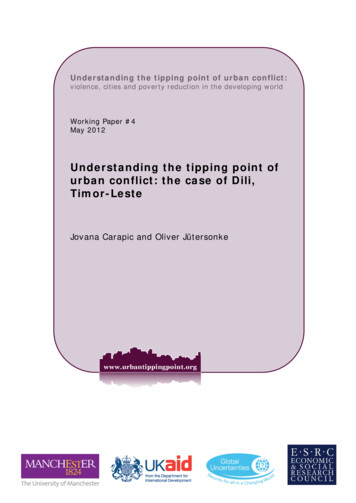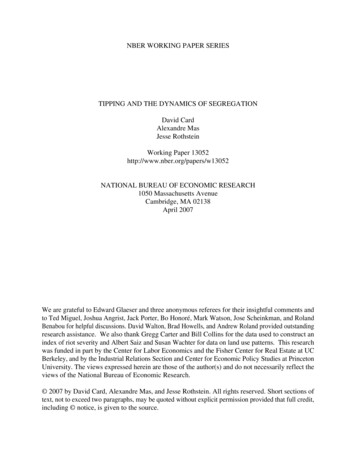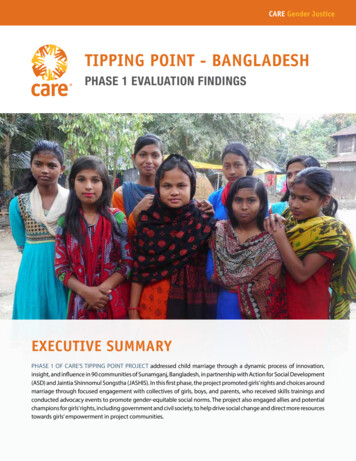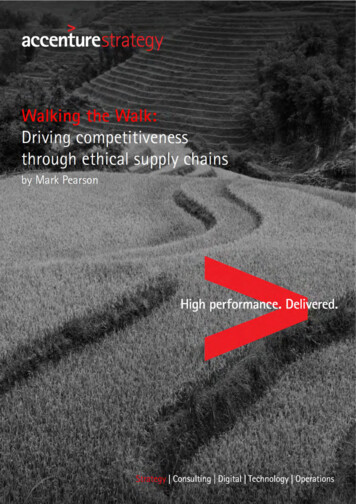
Transcription
Fair wages. Eco-friendly supply chains. Healthy margins. Operating ethically and operatingprofitability are no longer mutually exclusive concepts. And leading companies are walkingthe walk: balancing the goal of achieving commercial advantage with gaining social andenvironmental advantages. Better yet, those focused on this “triple advantage” in supply chainoperations can increase competitiveness through improved revenue and brand reputation whiledecreasing cost and risk.Tipping Pointretain new talent. Although Boomers andGeneration X may still be catching on tothe importance of corporate sustainability,Millennials (born between 1980 and2000) consider sustainable practicesto be essential. CEO’s are recognizingsustainability’s impact on the war fortalent.2 In fact, 46 percent of CEOs reportedthat employees would be among the mostinfluential groups in guiding their actionon sustainability over the next five years—second only to consumers.Business has reached a tipping point whenit comes to supply chain sustainability. Overthe years corporations have paid a lot of lipservice to the concept. But many, up untilthis point, viewed ethical supply chains asa “nice to have,” not a “must have.” Nowcompanies who continue to “talk the talk”instead of “walk the walk” when it comes toresponsible supply chains will begin losingtheir ability to grow and compete. Why?First let’s start with the customer.Consumers. Investors. Employees.Acting ethically imbues businesses thatgo beyond “talking the talk” with realcompetitive advantage. Just as automotivemanufacturers were trumped by brandsoffering enhanced safety as a core feature,companies that don’t embrace responsiblesupply chain practices risk falling behind,losing a competitive edge they may neverregain.Digital, particularly social media, is enablingcustomers to gain greater transparency,faster. The Rana Plaza disaster. Guangzhousweatshops. A company that looks awayas factory workers are exploited by a subsupplier will feel the ire of their globalcustomer base who will “vote with theirwallets.”Secondly, investors’ behavior is changing.Reputable analyst firms factor ethicalbehavior more and more into theirvaluations. Sustainability can createsignificant impact on stock prices which iscausing companies to take notice. In fact,according to Accenture UN research, 52percent of executives report that investorinterest is an incentive for them to investin sustainability, and 69 percent expectinvestor interest to be an increasinglyimportant factor in building sustainabilityissues into their core business.1From License to Operate toLicense to GrowTo sustain competiveness, companies needto recalibrate their strategies towardsethical behavior—moving from a focus oncompliance to differentiation. Companiesengaged in responsible supply chain effortsoften refer to their “license to operate.”That implies they’ve established trust withlocal governments and society by complyingwith regulations and establishing healthand safety programs that give them tacitpermission to do business. But companiesFinally, for companies that ignoresustainable business issues, it will becomeincreasingly difficult to attract and2
inertia and begin “walking the walk,” supplychain executives need to gain transparencywhen it comes to the multitude of levers topull. In the past, too many relied on “trialand error.” Thankfully, as the concept hasmatured, there are decision support toolsthat can help.for success: collaborating with competitors.Together with PepsiCo, Nestlé combinedparts of its supply chain for its fresh andchilled food products in the Belgian market.The horizontal collaboration approach notonly addresses low truck fill rates, but it alsoexploits retail customer overlaps.Eighty-seven percent of CEOs seesustainability as opportunity for growth andinnovation and 80 percent see it as a route tocompetitive advantage in their industry.8Nestlé bundled warehousingv, packagingand outbound distribution and synchronizeddeliveries to retailers to get full truck loads.This drove down transportation costs by 44percent. Compared to “classic groupage”optimization, this horizontal collaborationcreated 15 percent higher cost savings. Inaddition, carbon emissions were reducedby 55 percent with spill-over effects ontraffic and a decrease in accidents. Betteryet, service levels increased. The approachalso allowed Nestlé and PepsiCo to delivermore frequently—a key differentiator in freshproducts—driving up the overall satisfactionlevels of retailers and end customers.New forms of collaborationTo begin “walking the walk” of sustainability,it is key to collaborate across an extendedvalue chain of internal stakeholders,suppliers, sub-contractors, sub-subcontractors and the end consumer. Consideran electronics company that decidesto reduce the size of a given product.Collaboration starts with internal engineerswho may have to re-think product design.With new dimensions, suppliers have tobe informed, packaging re-considered.Now that the packaging is smaller, it maymake sense to join forces with anothercompany (or even competitor) to cut thecost of transportation. Retailers that sell theproduct need to check shelf size and layoutissues. And the end consumer may have amore energy-efficient product and shouldbe made aware of it. Net-net, the moreyou collaborate, the more companies findnew ways of getting social, environmentaland economic gain. Leading corporations“squeeze out” even more value from thetriple advantage by collaborating withcompetitors.Beyond the noble purposeCompanies need to move beyond theconcept of sustainable business practicesas “a noble purpose” and instead embracethem as a strategic weapon wielded to gainan advantage. But “walking the walk” meansgetting their numbers straight—building aclear business case for investments. Andpassing “trial and error” to go straight toproven methods by using decision supporttools that identify the most effective tripleadvantage practices.Those companies that hesitate do so attheir own peril: More and more customers,investors and employees demand ethicaloperations. Happily, by positively impactingsocio-environmental factors, the biggestbenefit lands on the bottom line throughnew sources of growth and innovation.Collaborating with competitorsTo achieve their own triple advantage,Nestlé9 has come up with an unusual recipe4
Tipping Point Business has reached a tipping point when it comes to supply chain sustainability. Over the years corporations have paid a lot of lip service to the concept. But many, up until this point, viewed ethical supply chains as a "nice to have," not a "must have." Now companies who continue to "talk the talk"
